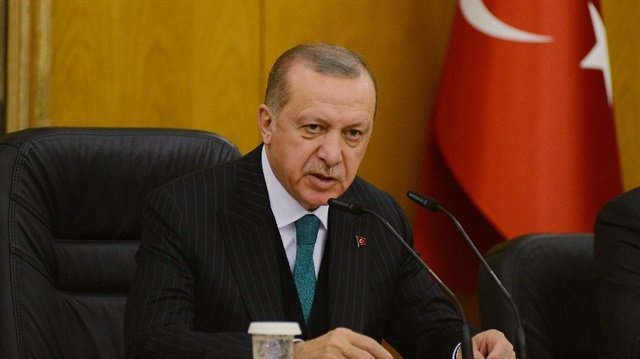
Erdoğan says ‘seven [agricultural] deals were signed,’ adding that ‘Turkey’s Rönesans Energy and Algeria signed an agreement of $1 billion to establish a petrochemical plant in Turkey’s Adana’
President Recep Tayyip Erdoğan announced a petrochemical deal at the Turkey-Algeria Business Forum he participated in during his visit on Tuesday. This is Erdoğan’s second trip as president to Algeria, which is one of Turkey’s most important economic partners in Africa.
“Algeria is Turkey’s biggest economic partner in Africa. I find our trade volume of $3.5 billion to be minimal, and there is benefit in raising this to $5 billion. Turkey's Ronesans and Bayegan and Algerian state-owned SONATRACH agreed on a $1 billion petrochemical investment deal,” Erdoğan said.
The investment will be made in the Adana Yumurtalik Free Zone, located in Turkey's Mediterranean province of Adana.
Erdoğan said the plant at the economic zone would produce 450,000 tons of polypropylene per year; raw material will be provided by Algeria.
Polypropylene is a thermoplastic polymer, which is used in various sectors such as spare parts used in the automotive industry, packaging of textile and food.
Once the plant becomes operational, Turkey will surpass issues in its current account deficit and external dependence will also be reduced by 25 percent, he added.
“Yesterday, our ministers formed agreements to improve cooperation in the field of agriculture. Seven deals were signed yesterday evening. We also attach importance to holding the joint economic commission meeting shortly. We will be able to take our future steps faster. We are aware that Algeria has been negatively impacted by energy prices. In spite of all the difficulties, we must increase our efforts to increase mutual trade,” Erdoğan said.
Erdoğan lauded Turkey’s development during the Business Forum, and said that Ankara would share its experience to benefit Algeria.
“Turkey is at an important place regarding the employment of our qualified labor force. Our exports rose from $36 billion dollars to $158 billion. We had reached the $36 million mark in tourism, and following a dip, we have now reached $32 million. When we first came to power, the Central Bank had a reserve of $27.5, and now it has a reserve of $120 billion. When we came to office, the debt to the IMF in 2002 was $23.5 billion. In 2013, we finalized our debt. The IMF asked us for a loan of £5 billion, and we provided it,” Erdoğan said.
“We have city hospital projects. Our patients will not go from one block to another on a stretcher. We continue to open these hospitals. We are bringing our healthcare services to a global brand level all over the world,” he added.
The concept of city hospitals are the latest in Turkey’s healthcare reforms which introduces an efficient way to manage the healthcare system by putting the private sector in charge for a limited time.
“We opened 29 new airports, bringing the world closer to our citizens. Last year, we provided 246 billion liras of social assistance to our citizens. According to the OECD, we are second to the U.S. [in aid]. We have hosted our brothers and sisters who have escaped from the conflicts in Syria and Iraq and came to Turkey with expenditures reaching $30 billion dollars,” Erdoğan said.

Six of the world’s 10 megaprojects over the last decade took place or are taking place in Turkey, Erdoğan said.
“I must place emphasis on our Eurasia Tunnel and Marmaray projects. The first phase of our new airport will be completed by the end of the year. In 2023, it will be completely done and will have the capacity to host 150 million passengers. Six of the world’s 10 megaprojects are in Turkey,” Erdoğan said.
The projects include the Yavuz Sultan Selim Bridge, Marmaray Tunnel, Eurasia Tunnel, and the world’s largest airport -- all in Istanbul -- as well as the Gulf of Izmit’s Osmangazi Bridge and the Izmir highway.



